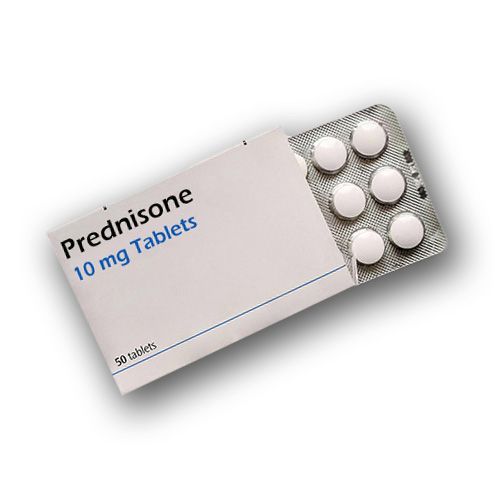Prednisone Over the Counter

Buy Prednisone Online Without a Prescription
If you need to buy Prednisone, our platform provides a seamless way to compare prices and purchase the medication from trusted online pharmacies. Start your treatment with Prednisone today and manage your health conditions effectively.
- Product Name: Prednisone
- Strength: 10 mg, 20 mg, 40 mg
- Available Packages: 30-360 pills
- Price per Pill: From $0.33
Overview
Prednisone is a widely used glucocorticoid medication with potent anti-inflammatory and immunosuppressive properties. It is prescribed for a broad range of conditions, including autoimmune disorders, allergic reactions, skin diseases, and certain types of cancers. Prednisone helps reduce inflammation, suppress the immune system, and manage symptoms of chronic and acute conditions effectively.
How to Use Prednisone
Prednisone is usually prescribed based on the severity of the condition and the patient's response to treatment. The medication is available in tablet form and should be taken orally according to the following guidelines:
Acute Symptoms
The recommended dose is 0.02-0.08 g per day, divided into 3-4 doses. The dosage is gradually reduced to 0.005-0.01 g per day as symptoms improve.
Dietary Considerations
A diet rich in proteins and low in salt is recommended during treatment with Prednisone.
Higher Dosages
In some cases, higher doses may be required, with a single dose of up to 0.015 g and a daily maximum of 0.1 g.
Combination Therapy
In cases of infectious diseases, Prednisone is often used alongside antibiotics and other chemotherapeutic agents.
Duration of Treatment
The length of treatment depends on the condition being treated and the patient’s response to therapy.
Potential Side Effects of Prednisone
Like all medications, Prednisone can cause side effects, especially with long-term use. Some common adverse reactions include:
Fluid Retention
Leading to edema and water/sodium retention.
Metabolic Effects
Such as hyperglycemia, glycosuria, and negative nitrogen balance.
Cardiovascular Effects
Including increased blood pressure and fatigue.
Musculoskeletal Effects
General muscle weakness and the potential development of osteoporosis.
Nervous System Effects
Nervous excitement, insomnia, psychosis, and convulsions (more common in children).
Other Effects
Hirsutism, amenorrhea, premature birth, and gastrointestinal issues.
To minimize these side effects, it is advised to reduce salt intake, increase potassium (through a diet rich in vegetables and fruits), and ensure adequate protein intake. If side effects occur, the medication may need to be discontinued, and appropriate measures taken to restore water-salt balance. Diuretics may be used to manage edema if necessary.
Special Instructions for Prednisone Use
Risk of Hypocorticism
rolonged use of Prednisone can lead to adrenal insufficiency (hypocorticism). It is crucial to taper the dose gradually at the end of treatment to avoid withdrawal symptoms.
Contraindications
Prednisone should not be used by individuals with known hypersensitivity to the drug, or in cases of peptic ulcer disease, thrombophlebitis, mental disorders, hypertension, heart failure, acute endocarditis, osteoporosis, or pregnancy.
Pregnancy
Prednisone is contraindicated during pregnancy due to potential risks to the fetus.
Start Your Journey to Wellness Today
Talk With Foot and Ankle Specialist Today!
Ready to take the first step towards healthier, pain-free feet? Contact us to schedule an appointment or to learn more about our foot and ankle services. Our dedicated podiatric team is here to provide personalized care and answer any questions you may have about your lower extremity concerns. Reach out today and let us help you achieve optimal foot health and mobility for an active lifestyle.

